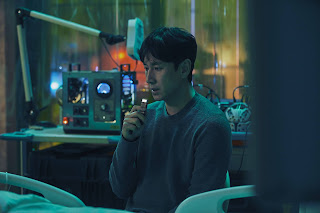
”Whatever the object was, I always wanted to take it apart and see what was hidden inside.”
 |
Lee Sun-kyun in Dr. Brain / Apple TV+ |
This quote, from the pilot of Apple TV+’s newest offering, the South Korean import Dr. Brain, quite evenly sums up my feelings for the show itself. Full of potential energy, something truly genius is hidden in the cracks of the 6-episode miniseries. And yet, in absolute defiance of the laws of thermodynamics, that energy all but disappears somewhere along the way.
In a pool of streaming services deeper than the Mariana Trench, Apple TV+ is, in my opinion, the oddest and most fascinating species to study. Its initial offerings were bloated with A-list names from Chris Evans to M. Night Shyamalan, but - in terms of actual quality - were middling at best. However, against all odds, the service later found a surprising niche in the comedy arena, churning out under-the-radar dramedies like Dickinson, creative revivals of flailing genres like workplace sitcom Mythic Quest, and - of course - who could forget that lovable Southern-fried hegemon, Ted Lasso? As successful as it became down that one avenue, though, the I-Streamer simply couldn’t crack the drama code - even with star-power-fueled awards favorite The Morning Show in their corner, Apple’s straight-faced fare barely even blips the cultural radar.
 |
Kim Jee-woon, director of Dr. Brain / Apple TV+ |
Dr. Brain, theoretically, was the perfect cure for this perceived woe. Coming from acclaimed director Kim Jee-woon (A Tale of Two Sisters), the show was meant mostly to accompany the launch of Apple TV+ in South Korea. However, complete with a more than competent director, meaty premise, and a talented cast, Dr. Brain had all the potential in the world to be Apple’s big dramatic break. Even potential complaints of a language barrier - although it feels like that sort of thing should hardly matter anymore - could be overcome thanks to nice timing, with the buzzy Squid Game acting as a foreign language springboard for picky Western audiences.
Pilots don’t impress me often, but Dr. Brain floored me. This is the real deal, I noted while watching. Intense, cerebral, enigmatic, surreal - deeply engulfed in my screener, I was rooting from minute one for the show's commercial and critical success. I was ready to declare it my show of the year - that’s how good it was.
And then, it wasn’t. More on that in a minute.
 |
| Lee Sun-kyun in Dr. Brain / Apple TV+ |
The series follows Dr. Se-won Koh (Lee Sun-kyun, most recognizable to western audiences from his turn as the Park patriarch in Parasite). Koh is a neuroscientist, implied to be on the autism spectrum, whose tragic past feeds an obsession with researching the limits of human consciousness. He wants to use his work to one day be able to “hack” into brains, as it were, and be able to extract memories and thoughts directly from comatose and recently deceased patients.
Based on a popular Korean Webtoon of the same name, the plot of Dr. Brain lives up to its source material, dripping with the dramatic, fantastical Webtoon aesthetic. Also drawing from its source material, the show is shockingly plot-dense, brimming with twists and revelations. On this note, the pacing is impressive, fully comprehensible although occasionally lightning fast jumping from A to B. We move in sync with Se-won, skipping over the mundanities he can’t be bothered with, while lingering on the things - and people - that haunt him.
Se-won, for his part, is a unique protagonist, escaping from many of the pitfalls that leading men in TV thrillers find themselves in; either being too charming or too grating, too perfect or too useless. Lee’s performance is reserved, playing the stereotypical “man on a mission” role with his cards to his chest. It feels like we’re never getting everything from him - and it makes me want more. Se-won is also one of the most accurate depictions of neurodivergence I’ve seen on television - that is to say, he’s mostly normal. His ASD is a trait that is certainly present and additive to his character, but it never morphs him into the “savant” character that plagues American TV to this day. It visibly challenges his relationships with his wife, co-workers and son, but it never makes him uncaring. Despite the cerebral premise, the show even manages to avoid the overused "mind palace" trope that paints the mind of a neurodivergent person as an impenetrable fortress where complex equations are completed in moments. Se-won's not a superhuman, he's just a guy - a guy who has cracked his own form of Inception technology, sure, but a guy nonetheless.
 |
| Lee You-young as Jae-yi in Dr. Brain / Apple TV+ |
What the pilot of Dr. Brain does do is open us up to a new world, a mystery involving the suspicious “death” of Se-won’s young son, Doo-yoon, and the resulting attempted suicide of his wife Jae-yi that led to her being comatose, hooked up to various wires and machines in the basement of her own house. Just around the time he perfects his mind-sync technology, Se-won is approached separately by the police and a private investigator, Kang-mu Lee, both interested in information about the recent death of a man named Jun-ki Lim, who supposedly knew Jae-yi. It’s a J.J. Abrams puzzle box of a narrative, and the first episode promises that the narrative will be unraveled in a manner nothing short of Nolan-esque.
Not to circle back to this again but this pilot really is a beautiful piece of filmmaking. Throughout the episode, Se-won syncs with several different dead bodies, only to find that when he syncs, he absorbs not only their memories but little parts of them as well. This leads to a magnificently memorable sequence where Se-won’s reality begins to melt and mix with those of the people he synced with - a deliciously creepy depletion of the show’s CGI budget. Kim’s direction is simultaneously restrained and bold, his aesthetics blissfully moody and urban. Watching this sequence, I truly believed that if this was what this show had to offer from the get-go, it must have something even more phenomenal around the corner.
Unfortunately, then, I must report that Dr. Brain is much like a well-used bookshelf. It sags in the middle.
It seems like an obvious choice, when making a show about a man who syncs his brain with that of the dead, to make these syncs a main character of the show. But after only a few goes, Dr. Brain seems to become disinterested in this premise, instead leaping headfirst into the Jun-ki Lim plotline and, with it, dime-a-dozen thriller territory. Sure, there are some interesting developments - early on, Se-won syncs his brain with a cat and finds that he has gained cat-like abilities - but all in all, we spend the rest of the series following Se-won as he essentially becomes a police consultant on the Lim case, and barely venturing to explore any of the ideas surrounding the syncs whatsoever.
 |
| Moon Sung-keun in Dr. Brain / Apple TV+ |
As it turns out, the entire mystery - the death of Lim, disappearance of Doo-yoon, and the near-death of Jae-yi - all have to do with an institute that Se-won was involved with when he was young. Disguising itself as a neurodivergence research clinic, the facility is actually trying to use its child patients to experiment with the same kind of memory transfer technology Se-won pioneered. The goal was to take the mind of Dr. Myung, the foundation’s aging patriarch, and place it into the body of a young, “gifted” child, granting him a new and more powerful brain and body (aaaaand even the neurodivergent representation I praised earlier is travelling toward stereotype now). The subject Dr. Myung chose is none other than Doo-yoon, whose death was elaborately faked by the institute. Jae-yi’s attempted suicide was also their doing, as she and Jun-ki (the parent of another patient of the clinic) didn’t believe that Doo-yoon was truly dead.
As trite as this plot point sounds, the bigger problem is that we barely learn of any of it until the mid-point of the second-to-last episode, meaning that for about half of the show, we mostly tread water, learning little about the actual plot but quite a bit about Jun-ki and Kang-mu (who Se-won realizes is an illusion created after he synced with a random body that turned out to be the investigator, killed for looking into Jun-ki’s murder). As a result, the first and last episodes really do the majority of the heavy lifting here, with episodes 2-4 feeling nigh inconsequential. While episode 6 delivered with the brain-bending, deeply-felt narrative closure sought, it felt much more empty of an ending knowing how much time I spent going in circles trying to get there.
I will absolutely give credit where it’s due, however - both Kim’s direction and Lee’s performance remain consistently top-notch throughout. At points in the narrative so meaningless I might’ve given up and dropped off for other shows, I could feel Kim’s clear vision and Se-won’s subtle but satisfying character arc tugging at me to stay. Kim’s direction is haunting, and many choices he made remain with me even now, weeks after I finished the series. For being a generic thriller, Dr. Brain does it well. Its flaws lie decisively less in what it is not and more in what it nearly could’ve been.
I find it unfortunate that Dr. Brain never got much promotion in the U.S. Obviously, it was made primarily to act as a selling point for Apple TV+ in Korea, but I think it could easily reach a wider audience, especially after the recent smash-hit popularity of Squid Game proved that the majority of Americans had finally learned to read subtitles (or at least listen to a dub). Kim is a phenomenal director, and an even-tempered blend of horror/drama is his wheelhouse. Perhaps, with better promotion, it still could’ve found a sticking place - while it is imperfect, it deserved far more than what it got.
Alas, now the series has come and gone with - from my account - not much more than a cultural whisper. I saved the publication of my review until the final episode embargo was lifted, wanting to give my full thoughts without fear of spoilers. Letting the show sit with me has allowed me to better judge both my appreciation of what it tried and my disappointment in where it failed, so maybe it's best that I did wait.
And maybe it’s best if Apple sticks to comedy.

